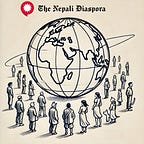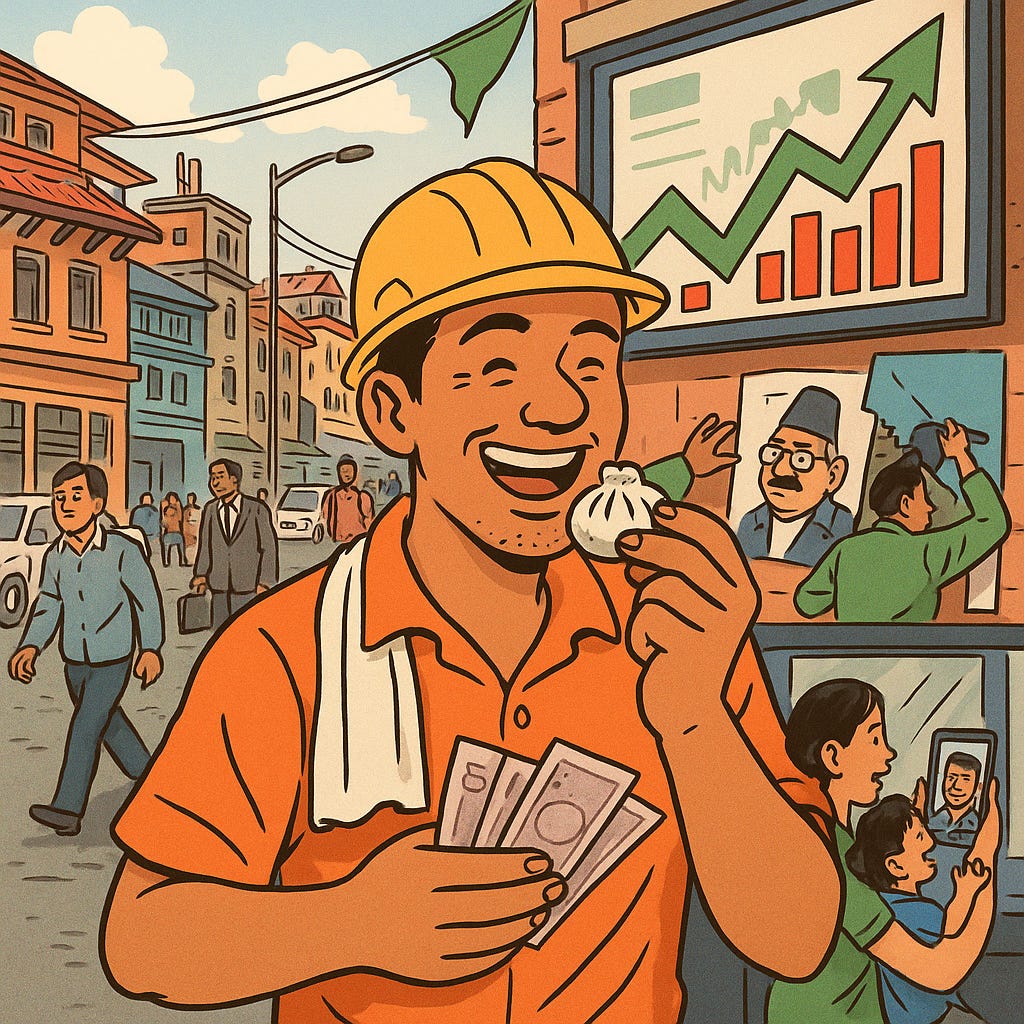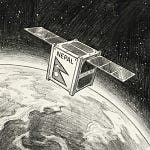Share the love! Help others that care about Nepal stay up to date the easy way. If you like this issue, share it with a friend who follows Nepal and hit Subscribe for your weekly dose of curated, can’t-miss updates.
Wage hikes, power plays, and mosquito drama—Nepal packed it all in this week. As salaries rise and political alliances fall, we’ve also got record stock trades, teenage football triumphs, and a bizarre dengue fix involving cement bans. Let’s dive into the madness, momentum, and maybe a bit of hope.
Economy & Development 💸
Nepal has raised its minimum monthly wage to Rs 19,550, a long-awaited step that impacts millions of workers and signals a modest win for labor advocates. The 13% increase, finalized through a tripartite agreement between the government, trade unions, and employers, will also automatically adjust benefits under the national social security fund, according to TRN. Officials say the move is meant to cushion households against inflation and stem the flow of workers heading abroad, but unions caution that enforcement remains patchy, especially in informal sectors. For diaspora readers comparing wage scales, the shift is meaningful—though still far from matching overseas earning power.
Investor confidence appears to be returning to Nepal’s financial sector. NEPSE turnover hit an all-time high of Rs 16.6 billion in a single day, with annual trading volume for FY 2024/25 up 189% to Rs 2.125 trillion, per KTM Post. Much of this activity is being fueled by optimism in key sectors—especially hydropower. MyRepublica reports that the long-delayed 900 MW Upper Karnali project has finally invited civil-works bids, and Rahughat's 40 MW plant has also secured a new deadline extension. Industry analysts estimate total energy investment will surpass Rs 3 trillion by 2035.
Other infrastructure efforts are progressing, albeit unevenly. The Siddhababa tunnel has crossed 57% completion, promising safer connectivity between Lumbini and Gandaki Provinces, while Phewa Lake’s long-awaited boundary demarcation is now underway, according to TRN. In the tourism sector, Mustang has opened an 8-km high-altitude cycling trail that’s already contributing to a 55% rise in arrivals. Meanwhile, the Nepal Tourism Board has passed a Rs 1.59 billion budget, with 70% allocated to international promotion, as reported by THT. These parallel tracks—wage reform, investment buzz, and eco-tourism—signal that while macro risks persist, momentum in key areas is building.
Politics & Governance 🏛️
Nepal’s ruling coalition faced a serious jolt this week as the Janata Samajbadi Party-Nepal (JSP-N) formally pulled its support from Prime Minister Oli’s government, citing 11 core governance failures. As reported by both THT and KTM Post, the party pointed to broken promises around federalism, transitional justice, and economic equity. The withdrawal reduces Oli’s margin in the National Assembly and adds further uncertainty to an already shaky ruling alliance.
In a related power consolidation move, the CPN-UML has voted to scrap both the age-70 limit and two-term cap for party leaders—changes widely interpreted as paving the way for Prime Minister Oli to extend his leadership. As noted by THT and TRN, the decision comes ahead of the party’s key statute convention this September. Observers say the move also blunts a possible comeback by former President Bidya Devi Bhandari, signaling tighter internal control as political jockeying intensifies.
Elsewhere in Kathmandu, tensions around governance and transparency continue to simmer. A leaked audiotape allegedly involving Land Minister Balram Adhikari in a Rs 3.2 million bribery case has triggered calls for investigation, though the minister strongly denies the claims. Meanwhile, MyRepublica reports that PM Oli is mulling a cabinet reshuffle, with several ministers already on edge. The Upper House has also begun probing allegations of bill tampering around civil service “cooling-off” clauses, raising questions about legislative integrity just as electoral coalitions begin to fracture.
Social & Cultural ⭐
In a major shift aimed at improving patient access, Nepal’s national health insurance program will now allow enrollees to start treatment at any of the country’s 377 public hospitals, removing the requirement to first go through local health institutions. According to THT, this change is expected to significantly benefit migrant workers’ families and people returning from abroad, many of whom struggled to navigate the previous referral system. Officials say the new policy should cut delays in diagnosis and treatment, and especially ease the burden in rural and high-mobility areas where access is already strained.
Meanwhile, a controversial dengue control proposal from Health Minister Pradip Paudel is drawing criticism from public health experts. As KTM Post reports, the minister suggested halting all construction work for four months to curb mosquito breeding. Critics argue the move is unscientific and impractical, pointing instead to the need for sustained community-level cleanups and better drainage systems. With Kathmandu bracing for its peak dengue season, doctors warn the government risks squandering trust by promoting blanket bans over targeted, evidence-based interventions.
Amid health concerns, cultural and environmental updates bring some balance. Nepal’s under-20 women’s football team crushed Sri Lanka 7–0 in the SAFF Championship, reviving hopes for a tournament win, according to MyRepublica. In Kathmandu, the Dharahara heritage tower has expanded visiting hours from 8 a.m. to 8 p.m., allowing more locals and tourists to take in its panoramic views, per KTM Post. On the environmental front, THT notes that the Kanchenjunga Conservation Area has introduced new GPS and camera traps to monitor wildlife, while TRN reports a localized outbreak of lumpy skin disease affecting cattle in Nawalparasi.
Diaspora & Globalization 🌏
Nepal is in talks with Israel to restart a suspended agriculture internship program that could send 1,000 Nepali students abroad annually. As THT reports, both governments are eager to resume the initiative, but concerns linger over worker exploitation and poor living conditions in Israel’s commercial farming sector. Rights groups note that while the program offers valuable skills and income, Israel’s declining reputation globally—amid criticism over labor rights and ongoing regional tensions—raises questions about the long-term ethical footing of such partnerships. Still, with limited domestic employment options, demand remains strong.
Meanwhile, regional mobility and representation are both seeing small but meaningful shifts. China is set to build a Bailey bridge at Rasuwagadhi to restore cross-border trade disrupted by floods, and 91 stranded Nepalis are expected to return home via Tatopani, according to KTM Post. On the advocacy front, Laxman Datt Pant has been elected to the global steering committee of the Global Forum for Media Development, making him the first Nepali to hold such a position, as reported by THT. Together, these stories highlight both the shifting nature of physical borders and the growing role of Nepalis in international platforms.
Did you know ❓
While many Asian countries were colonized, Nepal remains one of the few countries that was never colonized by a foreign power. Its unique geographical position between China and India helped it maintain its independence, and the country has a proud history of resisting colonial powers.
Let’s connect
Enjoying this issue? 📩 Share it with a friend & let’s keep Nepalis worldwide in the loop! Got thoughts? Hit reply—we’re all ears! Or let us know what you think via our Feedback form or follow us on Facebook | LinkedIn
P.S. Got a story or issue you'd like us to cover next week? Drop us a reply — we're building this space together.
About Nepali Diaspora Digest:
The Nepali Diaspora Digest connects the global Nepali community with curated news, insights, and stories that matter most. Join us as we celebrate and explore the diverse voices and achievements of Nepalis worldwide.
Partner shout out
belayat.uk: helping Nepalis connect in the UK on jobs, housing, events and finding local Nepali owned businesses














